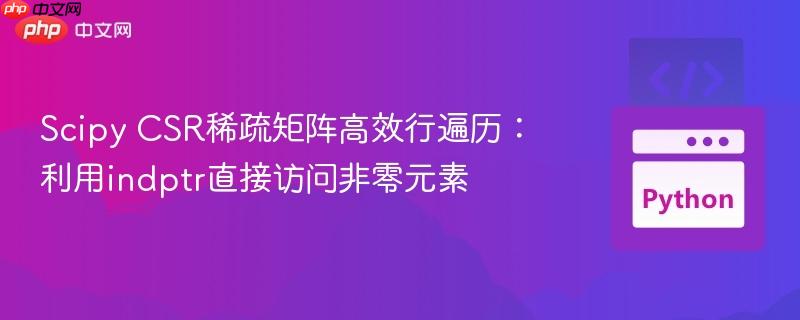
本文深入探讨了在scipy csr稀疏矩阵中高效遍历每行非零元素的方法。针对传统getrow()方法和转换为coo格式迭代的性能瓶颈,文章提出并详细阐述了直接利用csr格式的indptr、data和indices属性进行高效迭代的策略。通过基准测试,证明了该方法在大多数情况下能显著提升性能,并讨论了其行为差异及在极低密度矩阵下的适用性。
在处理大规模稀疏矩阵时,尤其是在机器学习和科学计算领域,我们经常需要遍历矩阵的每一行,以获取其中的非零元素及其对应的列索引和值。Scipy库提供了多种稀疏矩阵格式,其中CSR (Compressed Sparse Row) 格式因其高效的行操作而广受欢迎。然而,即使是CSR格式,如果不采用最优的遍历策略,也可能面临严重的性能瓶题。
理解Scipy CSR稀疏矩阵结构
要实现高效的行遍历,首先需要理解CSR格式的内部存储机制。一个scipy.sparse.csr_matrix对象主要由三个一维数组构成:
- data: 存储矩阵中所有非零元素的值,按行主序排列。
- indices: 存储data数组中每个非零元素对应的列索引。
- indptr: 行指针数组,长度为 行数 + 1。indptr[i]表示第i行非零元素在data和indices数组中的起始位置,indptr[i+1]表示第i行非零元素的结束位置(不包含)。因此,第i行的非零元素值位于data[indptr[i]:indptr[i+1]],其对应的列索引位于indices[indptr[i]:indptr[i+1]]。
这种结构使得CSR格式在进行行切片或行向量-向量乘法时表现出色,因为它能够快速定位到每一行的非零数据。
常见但低效的行遍历方法
在实际开发中,开发者可能会尝试以下两种方式来遍历CSR矩阵的行,但这两种方法都存在性能瓶颈:
1. 使用 matrix.getrow() 方法
这是最直观的遍历方式,通过循环调用getrow()方法获取每一行:
import scipy.sparse
from tqdm import tqdm # 用于进度显示,非性能瓶颈核心
def get_matrix_original(matrix, func):
for index in tqdm(range(matrix.shape[0]), desc="Processing rows", leave=False):
row = matrix.getrow(index)
indices = row.indices
values = row.data
func(indices, values) # 对当前行的非零元素进行处理缺点: getrow(index) 方法在每次调用时都会创建一个新的稀疏矩阵对象(即使只是一个单行矩阵),这带来了显著的额外开销,导致整体性能低下。
2. 转换为COO格式后迭代
另一种方法是将CSR矩阵转换为COO (Coordinate) 格式,然后遍历COO格式的row, col, data三元组:
def get_matrix_rows_coo(matrix, func):
coo_matrix = matrix.tocoo() # 转换为COO格式
old_i = None
indices = []
values = []
for i, j, v in zip(coo_matrix.row, coo_matrix.col, coo_matrix.data):
if i != old_i: # 当行索引变化时,处理上一行的非零元素
if old_i is not None:
func(indices, values)
indices = [j]
values = [v]
else:
indices.append(j)
values.append(v)
old_i = i
# 处理最后一组非零元素
if indices and values:
func(indices, values)缺点:
- 转换开销: 将CSR矩阵转换为COO格式本身就是一个耗时的操作,尤其是对于大型矩阵。
- 手动行分组: 在COO格式中,非零元素是按任意顺序存储的,需要额外的逻辑来判断行边界(if i != old_i),这增加了循环内部的计算负担。
高效的解决方案:直接利用CSR的indptr
CSR格式的indptr数组正是为高效行遍历而设计的。通过直接访问matrix.indptr、matrix.data和matrix.indices,我们可以避免上述两种方法的性能瓶颈。
def get_matrix_rows_efficient(matrix, func):
rows = matrix.shape[0]
for index in range(rows):
# 根据indptr获取当前行的非零元素在data和indices中的起始和结束位置
indptr_start = matrix.indptr[index]
indptr_end = matrix.indptr[index + 1]
# 直接切片获取当前行的非零值和列索引
values = matrix.data[indptr_start:indptr_end]
indices = matrix.indices[indptr_start:indptr_end]
func(indices, values) # 对当前行的非零元素进行处理核心优势:
- 无格式转换开销: 无需将CSR矩阵转换为其他格式。
- 直接获取行边界: indptr数组直接提供了每行的起始和结束索引,无需额外计算或比较。
- 高效数据访问: Python的切片操作(matrix.data[start:end])通常会返回原始数组的视图(view),而不是创建副本,这大大减少了内存开销和数据复制时间。
行为差异说明:
值得注意的是,get_matrix_rows_efficient方法即使对于空行(即没有非零元素的行),也会调用func函数,并传入空的indices和values数组。而get_matrix_original(使用getrow())和get_matrix_rows_coo(在没有非零元素时不会触发func调用)可能不会对空行执行操作。在设计func函数时,需要考虑这种行为差异。
性能基准测试
为了量化不同方法的性能差异,我们设计了一个基准测试。
测试设置:
- 矩阵大小:10000行 x 5000列。
- 矩阵格式:CSR。
- 稀疏度:1%(即1%的元素为非零)。
- 测试函数:donothing,一个空函数,用于模拟对非零元素的处理,确保测试主要衡量迭代本身的开销。
- COO方法计时:包含CSR到COO的转换时间。
import scipy.sparse
import numpy as np
import timeit
# 1. 创建一个稀疏矩阵用于测试
matrix = scipy.sparse.random(10000, 5000, format='csr', density=0.01, random_state=42)
# 2. 定义一个空函数,用于模拟对非零元素的操作
def donothing(*args):
pass
# 3. 定义三种迭代方法
# 方法一: 使用 .getrow()
def get_matrix_original(matrix, func):
for index in range(matrix.shape[0]):
row = matrix.getrow(index)
indices = row.indices
values = row.data
func(indices, values)
# 方法二: 转换为 COO 格式后迭代
def get_matrix_rows_coo(matrix, func):
coo_matrix = matrix.tocoo()
old_i = None
indices = []
values = []
for i, j, v in zip(coo_matrix.row, coo_matrix.col, coo_matrix.data):
if i != old_i:
if old_i is not None:
func(indices, values)
indices = [j]
values = [v]
else:
indices.append(j)
values.append(v)
old_i = i
# 处理最后一组
if indices and values:
func(indices, values)
# 方法三: 直接利用 CSR 的 indptr (高效方法)
def get_matrix_rows_efficient(matrix, func):
rows = matrix.shape[0]
for index in range(rows):
indptr_start = matrix.indptr[index]
indptr_end = matrix.indptr[index + 1]
values = matrix.data[indptr_start:indptr_end]
indices = matrix.indices[indptr_start:indptr_end]
func(indices, values)
# 4. 运行基准测试
print(".getrow() method:")
%timeit get_matrix_original(matrix, donothing)
print("COO and iterate method:")
%timeit get_matrix_rows_coo(matrix, donothing)
print("CSR direct access method:")
%timeit get_matrix_rows_efficient(matrix, donothing)基准测试结果:
在一个典型的运行环境中,测试结果可能如下:
.getrow() method 634 ms ± 16.8 ms per loop (mean ± std. dev. of 7 runs, 1 loop each) COO and iterate method 270 ms ± 4.4 ms per loop (mean ± std. dev. of 7 runs, 1 loop each) CSR direct access method 12.4 ms ± 112 µs per loop (mean ± std. dev. of 7 runs, 100 loops each)
从结果中可以清楚地看到,直接利用CSR的indptr进行迭代的方法(CSR direct access method)比其他两种方法快了数十倍甚至上百倍,性能提升非常显著。
注意事项与总结
- 性能压倒性优势: 对于大多数需要遍历CSR稀疏矩阵行非零元素的场景,直接利用matrix.indptr、matrix.data和matrix.indices的方法是性能最优的选择。
- 极低密度矩阵的考量: 在极少数情况下,如果矩阵的稀疏度非常低(例如,非零元素密度低于0.05%),并且包含大量的空行,那么转换为COO格式进行迭代可能会略快于直接CSR方法。这是因为COO格式在内部不存储空行,因此在遍历时无需处理它们。而直接CSR方法即使对于空行,也会执行切片操作(尽管切片结果是空的),这可能会带来微小的开销。但在绝大多数实际应用中,这种差异可以忽略不计。
- 函数设计: 当使用高效的get_matrix_rows_efficient方法时,请记住它会为每一行(包括空行)调用传入的func函数。确保您的func函数能够正确处理空数组输入。
总之,在Scipy CSR稀疏矩阵中进行行遍历时,应优先考虑直接利用其内部的indptr、data和indices数组。这种方法不仅避免了不必要的对象创建和格式转换开销,还充分利用了CSR格式的固有优势,从而实现了卓越的性能表现。






























